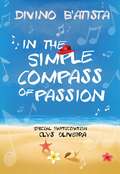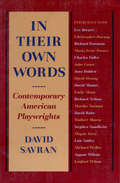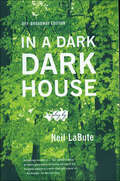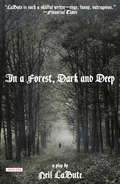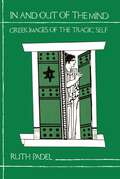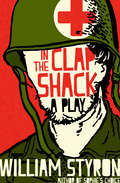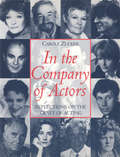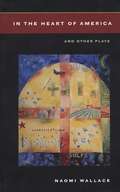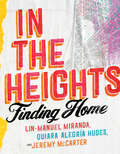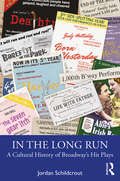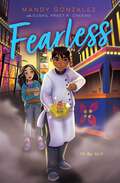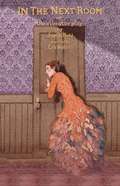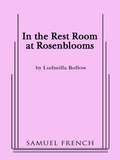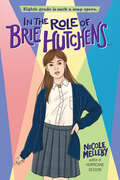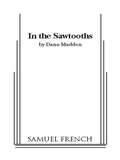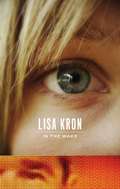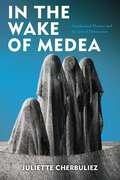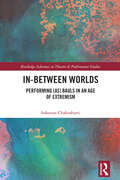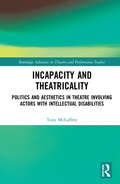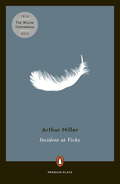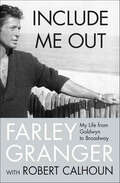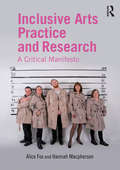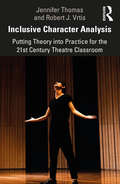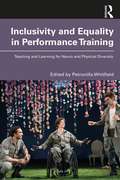- Table View
- List View
In The Pines: Columbia River Book 3
by Kendra ElliotClues to a hidden treasure. Clues to a family secret. Both lead to murder in a twisting novel of suspense by Amazon Charts and Wall Street Journal bestselling author Kendra Elliot. A national treasure hunt with a $2 million prize has driven obsessed fortune seekers to overrun the small town of Eagle’s Nest, Oregon. The hunt’s cryptic clues and the lure of wealth have exposed the desperate side of human greed: theft, fights, trespassing—and even the motive to kill. Police chief Truman Daly craves peace in his town but has a murder on his hands instead. Now the big prize isn’t the only thing hiding in the pines. So is a killer. When a young boy walks into the local café and claims his mother and baby sister have been missing for weeks, FBI special agent Mercy Kilpatrick investigates and exposes a disturbing twist in his story. Deep family secrets and lies that started sixty years ago have burst into the present, bringing with them deadly consequences. Mercy’s and Truman’s investigations lead down a path of murder, revenge, and buried secrets to uncover two intertwined mysteries as dark as an Oregon forest.
In The Simple Compass of Passion
by Raíssa Ribeiro DominguesMariana is a little coastal city which every year turns into the big music festival stage "Águas Sonoras". During two days, the tranquility of Mariana gives way to a frenzied frenzy of young people in and around the city. Daniel Vandres is the vocalist of the band "Sound of Silence", the main attraction of the festival. He, however, did not imagine that he would cross the path of the dreamy Josy who just think about work but it is convinced by her sister to go to the festival to have some fun. Roberta nurtures a platonic love for Daniel since childhood and is capable of any madness for the singer to notice her. It is in the middle of one of this madness that they know Beto and Miguel, two boys who will make Josy rethink a little about her concepts of fun.
In Their Own Words
by David SavranIncludes: Lee Breuer, Christopher Durang, Richard Foreman, Maria Irene Fornes, Charles Fuller, John Guare, Joan Holden, David Henry Hwang, David Mamet, Emily Mann, Richard Nelson, Marsha Norman, David Rabe, Wallace Shawn, Stephen Sondheim, Megan Terry, Luis Valdez, Michael Weller, August Wilson and Lanford Wilson.
In a Dark Dark House: A Play
by Neil LaButeTwo brothers meet on the grounds of a private psychiatric facility. Drew, has been court-confined for observation and has called his older brother, Terry, to corroborate his claim of childhood sexual abuse by a young man from many summers ago. Drew's request releases barely-hidden animosities between the two: Is he using these repressed memories to save himself while smearing the name of his brother's friend? Through pain and acknowledged betrayal, the brothers come to grips with and begin to understand the legacy of abuse, both inside and outside their family home. In a Dark, Dark House is the latest work from Neil LaBute, American theater's great agent provocateur. The play will have its world Premiere in May 2007, Off Broadway at New York's MCC Theater.
In a Forest, Dark and Deep: A Play
by Neil LabuteBetty and Bobby are sister and brother, but they have little in common. She's a college professor with a prim demeanor, and he's a carpenter with a foul mouth and violent streak. Betty has a history of promiscuity that Bobby won't let her forget, and from their first taunting exchanges there are intimations also of the history between them. Yet on the night when Betty urgently needs help to empty her cabin in the woods--the cabin she's been renting to a male student--she calls on Bobby. In this exhilarating play of secrets and sibling rivalry, which had its premiere in London's West End in 2011, Neil LaBute unflinchingly explores the dark territory beyond, as Bobby sneeringly says, "the lies you tell yourself to get by."
In and Out of the Mind: Greek Images of the Tragic Self
by Ruth PadelRuth Padel explores Greek conceptions of human innerness and the way in which Greek tragedy shaped European notions of mind and self. Arguing that Greek poetic language connects images of consciousness, even male consciousness, with the darkness attributed to Hades and to women, Padel analyzes tragedy's biological and daemonological metaphors for what is within.
In the Clap Shack: A Play (Vintage International Series)
by William StyronA military hospital is the setting for this darkly humorous play by the #1 New York Times–bestselling author of Darkness Visible and Sophie&’s Choice. In the summer of 1943, a young Marine named Wally Magruder arrives at a Navy hospital in the American South, stricken with what doctors diagnose as a severe case of syphilis. Trapped in the stifling confines of the urology ward, Magruder and his fellow patients rebel against the authoritarian Dr. Glanz, a physician who delights in the power that sickness gives him. But as they seek to reclaim their identities against dehumanization, the ward becomes a hell more real than any of them could have imagined. Inspired by Styron&’s own experience, In the Clap Shack is a searing indictment of military brutalization and a brilliant defense of individualism and personal freedom from the National Book Award and Pulitzer Prize–winning author of The Confessions of Nat Turner and other acclaimed works.This ebook features new manuscripts, rare photos, and never-before-seen documents from the William Styron archives at Duke University.
In the Company of Actors: Reflections on the Craft of Acting (Stage And Costume Ser.)
by Carole ZuckerIn the Company of Actors is a wonderful ensemble of entertaining and illuminating discussions with sixteen of the most celebrated and prestigious actors in contemporary theatre, film and television. The impressive list of actors includes: Eileen Atkins, Alan Bates, Simon Callow, Judi Dench, Brenda Fricker, Nigel Hawthorne, Jane Lapotaire, Janet McTeer, Ian Richardson, Miranda Richardson, Stephen Rea, Fiona Shaw, Anthony Sher, Janet Suzman, David Suchet, and Penelope Wilton. Carole Zucker covers a wide range of topics including the actors' main childhood influences, their actor training, early acting experience, preparation for roles and sound advice for coping with actors' problems such as creative differences with other actors or directors.
In the Heart of America and Other Plays
by Naomi WallaceNaomi Wallace's plays speak the underside of life. Her characters suffer and survive against the enormous weight of the times with a dignity that inspires. Her work challenges the audience and reader to reexamine the conflicts and meaning of our everyday lives through her singular, poetic imagery and language.Includes: One Flea SpareIn the Heart of AmericaSlaughter CityThe War BoysThe Trestle at Pope's Creek
In the Heights: Finding Home
by Quiara Alegría Hudes Lin-Manuel Miranda Jeremy McCarterThe eagerly awaited follow-up to the #1 New York Times bestseller Hamilton: The Revolution, Lin-Manuel Miranda’s new book gives readers an extraordinary inside look at In the Heights, his breakout Broadway debut, written with Quiara Alegría Hudes, now a Hollywood blockbuster. <P><P>In 2008, In the Heights, a new musical from up-and-coming young artists, electrified Broadway. The show’s vibrant mix of Latin music and hip-hop captured life in Washington Heights, the Latino neighborhood in upper Manhattan. It won four Tony Awards and became an international hit, delighting audiences around the world. For the film version, director Jon M. Chu (Crazy Rich Asians) brought the story home, filming its spectacular dance numbers on location in Washington Heights. <P><P>That’s where Usnavi, Nina, and their neighbors chase their dreams and ask a universal question: Where do I belong? In the Heights: Finding Home reunites Miranda with Jeremy McCarter, co-author of Hamilton: The Revolution, and Quiara Alegría Hudes, the Pulitzer Prize–winning librettist of the Broadway musical and screenwriter of the film. <P><P>They do more than trace the making of an unlikely Broadway smash and a major motion picture: They give readers an intimate look at the decades-long creative life of In the Heights. Like Hamilton: The Revolution, the book offers untold stories, perceptive essays, and the lyrics to Miranda’s songs—complete with his funny, heartfelt annotations. It also features newly commissioned portraits and never-before-seen photos from backstage, the movie set, and productions around the world. This is the story of characters who search for a home—and the artists who created one. <P><P><b>A New York Times Best Seller</b>
In the Long Run: A Cultural History of Broadway’s Hit Plays
by Jordan SchildcroutIn the Long Run: A Cultural History of Broadway’s Hit Plays presents in-depth analysis of 15 plays that ran over 1,000 performances, examining what made each so popular in its time—and then, in many cases, fall into obscurity. Covering one hundred years of theatre history, it traces the long-running Broadway play as a distinct cultural phenomenon that rises and falls from 1918 to 2018. Each chapter focuses on the longest-running plays of a particular decade, synthesizing historical research and dramaturgical analysis to explain how they functioned as works of theatrical art, cultural commodities, and reflections of the values, conflicts, and fantasies of their times. At the heart of each play’s history are the ideological contradictions often present in works of popular culture that appeal to diverse audiences, particularly around issues of gender, race, class, and sexuality. Suitable for anyone with an interest in Broadway and its history, In the Long Run explores the nature of time in this ephemeral art form, the tensions between commerce and art, between popularity and prestige, and the changing position of the Broadway play within American popular culture.
In the Mix (Fearless Series #3)
by Mandy GonzalezBetter Nate than Ever meets Love Sugar Magic in this sweet third novel in the Fearless middle grade series from Hamilton and Broadway star Mandy Gonzalez about a young thespian who feels caught between his love of baking and theatre.Twelve-year-old Hudson Patel has two great loves: Broadway and baking! In addition to giving his all to his role in the hit show Our Time, Hudson takes pride in keeping his castmates and fellow Fearless Squad members well-fed with all the delicious treats he creates. When the call comes in for a big baking show—with the winner receiving a spot at a kiosk in Times Square—the Squad encourages him to enter. They just know that kiosk should be his. But Hudson struggles to create a showstopper, and his friends realize if Hudson goes all-in with the baking, he may not have time to spare for his stage role. Hudson goes to his grandmother for help, and she suggests going back to his roots, to be proud of who he is, and to show that in his culinary creation. With time running out, can Hudson find the magical ingredient that will put him in the spotlight without having to choose between his passions?
In the Next Room (or the vibrator play)
by Sarah Ruhl"A fascinating, funny and evocative play. . . . Ruhl develops the story with the enticing blend of irreverent humor and skewed realism. . . . It's beautiful." -San Francisco Chronicle"[This] breathtakingly inventive addition to Ruhl's singular body of work . . . has the potential to be a modern masterpiece."-Los Angeles TimesSarah Ruhl made her Broadway debut this fall with her latest effervescent comedy: a play about sex, intimacy, and equality, set in the 1880s, when enthusiasm for the electric light bulb gave rise to a handy new instrument to treat female hysteria. The story revolves around the medical office and home of Dr. Givings, who regularly induces "paroxysm" in his once high-strung patient Sabrina, allowing her to happily return to playing piano. Soon, Sabrina falls in love with the doctor's assistant Annie, and also befriends his wife Catherine, who is dealing with her own neurotic misgivings about not being able to breast-feed her baby. With this new work, Ruhl once again uses playful symbolism and lyrical language as she makes seemingly effortless thematic leaps--crafting a play with tremendous critical and audience appeal, in her singular theatrical voice.Sarah Ruhl's plays include Dead Man's Cell Phone, The Clean House (a Pulitzer Prize finalist), Passion Play, and Eurydice, all of which have been widely produced throughout the United States and internationally. She is a recipient of the MacArthur Fellowship.
In the Rest Room at Rosenblooms
by Ludmilla Bollow4f and 9 extras (can be doubled) / Comedy / Interior / This contemporary comedy reveals the hopes, dreams and fears of three elderly ladies who spark their lonely lives by meeting daily in the rest room lounge of an outdated downtown department store, and the crazy/touching events that occur the day one of them is supposedly threatened. There's Myrah, with a fighting spirit that totters into the absurd; Violet, a leftover from the days of elegance; and Winifred, a wisp of a woman who wanders in and out of reality. A steady stream of bizarre events occur as the ladies seek to protect Winifred from being taken away by her sister Clare, leading to a blockade of the rest room and a final triumph over those who would threaten their fragile freedom. Winner of the Southeastern Theatre Conference New Play Award. / "The women are wonderful characters...[the play does] an excellent job of balancing humor against the basically pathetic lives of the three main characters." - Minneapolis Tribune
In the Role of Brie Hutchens...
by Nicole MellebyAn own-voices LGBTQ novel from the acclaimed author of Hurricane Season, about eighth-grader Brie, who learns how to be true to herself and to her relationships with family, friends, and faith. <P><P>Introducing Brie Hutchens: soap opera super fan, aspiring actor, and so-so student at her small Catholic school. Brie has big plans for eighth grade. She’s going to be the star of the school play and convince her parents to let her go to the performing arts high school. But when Brie’s mom walks in on her accidentally looking at some possibly inappropriate photos of her favorite actress, Brie panics and blurts out that she’s been chosen to crown the Mary statue during her school’s May Crowning ceremony. Brie’s mom is distracted with pride—but Brie’s in big trouble: she has not been chosen. No one has, yet. <P><P>Worse, Brie has almost no chance to get the job, which always goes to a top student. Desperate to make her lie become truth, Brie turns to Kennedy, the girl everyone expects to crown Mary. But sometimes just looking at Kennedy gives Brie butterflies. Juggling her confusing feelings with the rapidly approaching May Crowning, not to mention her hilarious non-star turn in the school play, Brie navigates truth and lies, expectations and identity, and how to—finally—make her mother really see her as she is.
In the Sawtooths
by Dano Madden3m / Winner of the Kennedy Center's 2007 National Student Playwriting Award / Oby, Nellie and Darin have been friends since high school. Now in their thirties, they have become busier in their lives, but one thing remains constant: their annual backpacking adventure in the mountains of Idaho. As their trip nears and they have made all of the necessary preparations to survive in the outdoors, their lives are suddenly shattered by tragedy. What ensues is a true test of an old friendship. Can Oby, Nellie and Darin remain friends as they desperately try to navigate through an immense and unexpected wilderness? In the Sawtooths was developed at the Seven Devils Playwrights Conference in Idaho and at The Lark Play Development Center in New York City.
In the Wake
by Lisa Kron"Funny, moving, and undeniably sexy. The heady blend of smart dialogue and characters. . .makes it a candidate to be the Angels in America of the Bush II decade."-San Francisco Chronicle"The two works [Angels in America and In the Wake] use a volatile chapter in American history as background in their exploration of how the sociopolitical maladies of an age play out in the personal conduct of characters."- Charles McNulty, Los Angeles TimesLisa Kron, author of Broadway's Well and the OBIE-winning solo show 2.5 Minute Ride, has taken on the big question of our country's character. On the Thanksgiving after the controversial 2000 election, political junkie Ellen gathers with family and friends in her cramped New York apartment. But she soon discovers-with an unexpected passionate encounter-that ideas about America and our own selves are not as fixed as they once seemed. A play with plenty of humor and passion to go with its politics, Kron's work premiered last year at Berkeley Rep and Los Angeles' Center Theater Group, and debuted at The Public Theater in New York this fall.Lisa Kron's plays have been performed on Broadway, off-Broadway, and around the world. She is a founding member of the award-winning theater group The Five Lesbian Brothers, and teaches playwriting at Yale University.
In the Wake of Medea: Neoclassical Theater and the Arts of Destruction
by Juliette CherbuliezIn the Wake of Medea examines the violence of seventeenth-century French political dramas. French tragedy has traditionally been taken to be a passionless, cerebral genre that refused all forms of violence. This book explores the rhetorical, literary, and performance strategies through which violence persists, contextualizing it in a longer literary and philosophical history from Ovid to Pasolini.The mythological figure of Medea, foreigner who massacres her brother, murders kings, burns down Corinth, and kills her own children, exemplifies the persistence of violence in literature and art. A refugee who is welcomed yet feared, who confirms the social while threatening its integrity, Medea offers an alternative to western philosophy’s ethical paradigm of Antigone. The Medean presence, Cherbuliez shows, offers a model of radically persistent and disruptive outsiderness, both for classical theater and for its wake in literary theory.In the Wake of Medea explores a range of artistic strategies integrating violence into drama, from rhetorical devices like ekphrasis to dramaturgical mechanisms like machinery, all of which involve temporal disruption. The full range of this Medean presence is explored in treatments of the character Medea and in works figuratively invoking a Medean presence, from the well-known tragedies of Racine and Corneille through a range of other neoclassical political theater, including spectacular machine plays, Neo-Stoic parables, didactic Christian theater. In the Wake of Medea recognizes the violence within these tragedies to explain why violence remains so integral to literature and arts today.
In-Between Worlds: Performing [as] Bauls in an Age of Extremism (Routledge Advances in Theatre & Performance Studies)
by Sukanya ChakrabartiThis book examines the performance of Bauls ‘folk’ performers from Bengal, in the context of a rapidly globalizing Indian economy and against the backdrop of extreme nationalistic discourses. Recognizing their scope beyond the musical and cultural realm, Sukanya Chakrabarti engages in discussing the subversive and transformational potency of Bauls and their performances. In-Between Worlds argues that the Bauls through their musical, spiritual, and cultural performances offer ‘joy’ and ‘spirituality,’ thus making space for what Dr. Ambedkar in his famous 1942 speech had identified as ‘reclamation of human personality’. Chakrabarti destabilizes the category of ‘folk’ as a fixed classification or an origin point, and fractures homogeneous historical representations of the Baul as a ‘folk’ performer and a wandering mendicant exposing the complex heterogeneity that characterizes this group. Establishing ‘folk-ness’ as a performance category, and ‘folk festivals’ as sites of performing ‘folk-ness,’ contributing to a heritage industry that thrives on imagined and recreated nostalgia, Chakrabarti examines different sites that produce varied performative identities of Bauls, probing the limits of such categories while simultaneously advocating for polyvocality and multifocality. While this project has grounded itself firmly in performance studies, it has borrowed extensively from fields of postcolonial studies and subaltern histories, literature, ethnography and ethnomusicology, and cosmopolitan studies.
Incapacity and Theatricality: Politics and Aesthetics in Theatre Involving Actors with Intellectual Disabilities (Routledge Advances in Theatre & Performance Studies)
by Tony McCaffreyIncapacity and Theatricality acknowledges the distinctive contribution to contemporary theatrical performance made by actors with intellectual disabilities. It presents a close examination of certain key theatrical performances across a variety of different media, including John Cassavetes’ 1963 social issues film A Child Is Waiting; the performance art collaboration between Robert Wilson and Christopher Knowles; and the provocative pranksterism of Christoph Schlingensief’s talent show mockumentary FreakStars 3000. Tracing a global path of performances, Incapacity and Theatricality offers an analysis of how actors with intellectual disabilities have emerged onto the main stage, and how their inclusion calls into question long-held assumptions about both theatre and intellectual disability. For postgraduate students, or anyone interested in the shifting dynamics of twenty-first century theatre, McCaffrey’s work offers a vital consideration of the intersubjective relations between people with and without intellectual disabilities and ultimately addresses urgent questions about the situation and representation of the contemporary subject caught up somewhere between incapacity and theatricality.
Incident at Vichy: A Play (Penguin Plays)
by Arthur MillerIn Vichy France in 1942, eight men and a boy are seized by the collaborationist authorities and made to wait in a building that may be a police station. Some of them are Jews. All of them have something to hide-if not from the Nazis, then from their fellow detainees and, inevitably, from themselves. For in this claustrophobic antechamber to the death camps, everyone is guilty. And perhaps none more so than those who can walk away alive.In Incident at Vichy, Arthur Miller re-creates Dante's hell inside the gaping pit that is our history and populates it with sinners whose crimes are all the more fearful because they are so recognizable."One of the most important plays of our time . . . Incident at Vichy returns the theater to greatness." -The New York Times
Include Me Out: My Life from Goldwyn to Broadway
by Farley Granger Robert CalhounThe star of Hitchcock’s Rope and Strangers on a Train “recalls life onstage and in film in an engaging, colorful memoir” (Kirkus Reviews, starred review).Synonymous with the golden age of Broadway, the dazzling lights of Hollywood, and the rise of television arts, Farley Granger’s charm and talent captivated the acting community and audiences alike. Working with creative visionaries like Alfred Hitchcock, Luchino Visconti, and Nick Ray, Granger was a celebrated figure in films like Strangers on a Train, Rope, Senso, and They Live by Night, bringing to the big screen a stunningly memorable presence.But behind his characters, he was an intensely complex man. In his richly told memoir, Granger details his life with disarming candor. Rich in personal insight, he describes his relationships with both men and women and reminisces about legends he knew with private familiarity—from Shelley Winters and Joan Crawford to Leonard Bernstein and Tyrone Power.Recreating not only his personal struggles but his legendary struggle to free himself of his contract with Sam Goldwyn, Granger reveals none so elegantly as he does himself. Include Me Out is as much a story of classic Hollywood glamour as it is a collection of iconic theatrical portraits, all from the man who knew them all.“This polished and perceptive memoir etches a scintillating portrait of life inside Tinseltown soundstages where ‘nothing was real except anxiety, insecurity and fear’ . . . The book has a huge celebrity cast, from Mike Todd, Rita Hayworth and Cornelia Otis Skinner to Leonard Bernstein and Peggy Guggenheim. Granger and Calhoun write with a stylish and iridescent flair.” —Publishers Weekly
Inclusive Arts Practice and Research: A Critical Manifesto
by Alice Fox Hannah MacphersonInclusive Arts Practice and Research interrogates an exciting and newly emergent field: the creative collaborations between learning-disabled and non-learning-disabled artists which are increasingly taking place in performance and the visual arts. In Inclusive Arts Practice Alice Fox and Hannah Macpherson interview artists, curators and key practitioners in the UK and US. The authors introduce and articulate this new practice, and situate it in relation to associated approaches. Fox and Macpherson candidly describe the tensions and difficulties involved too, and explore how the work sits within contemporary art and critical theory. The book inhabits the philosophy of Inclusive Arts practice: with Jo Offer, Alice Fox and Kelvin Burke making up the design team behind the striking look of the book. The book also includes essays and illustrated statements, and has over 100 full-colour images. Inclusive Arts Practice represents a landmark publication in an emerging field of creative practice across all the arts. It presents a radical call for collaboration on equal terms and will be an invaluable resource for anyone studying, researching or already working within this dynamic new territory.
Inclusive Character Analysis: Putting Theory into Practice for the 21st Century Theatre Classroom
by Jennifer Thomas Robert J. VrtisInclusive Character Analysis foregrounds representations of race, gender, class, ability, and sexual orientation by blending script analysis with a variety of critical theories in order to create a more inclusive performance practice for the classroom and the stage. This book merges a traditional Stanislavski-based script analysis with multiple theoretical frameworks, such as gender theory, standpoint theory, and critical race theory, to give students in early level theatre courses foundational skills for analyzing a play, while also introducing them to contemporary thought about race, gender, and identity. Inclusive Character Analysis is a valuable resource for beginning acting courses, script analysis courses, the directing classroom, early design curriculum, dramaturgical explorations, the playwriting classroom, and introduction to performance studies classes. Additionally, the book offers a reader-style background on theoretical frames for performance faculty and practitioners who may need assistance to integrate non-performance centered theory into their classrooms.
Inclusivity and Equality in Performance Training: Teaching and Learning for Neuro and Physical Diversity
by Petronilla WhitfieldInclusivity and Equality in Performance Training focuses on neuro and physical difference and dis/ability in the teaching of performance and associated studies. It offers 19 practitioners’ research-based teaching strategies, aimed to enhance equality of opportunity and individual abilities in performance education. Challenging ableist models of teaching, the 16 chapters address the barriers that can undermine those with dis/ability or difference, highlighting how equality of opportunity can increase innovation and enrich the creative work. Key features include: Descriptions of teaching interventions, research, and exploratory practice to identify and support the needs and abilities of the individual with dis/ability or difference Experiences of practitioners working with professional actors with dis/ability or difference, with a dissemination of methods to enable the actors A critical analysis of pedagogy in performance training environments; how neuro and physical diversity are positioned within the cultural contexts and practices Equitable teaching and learning practices for individuals in a variety of areas, such as: dyslexia, dyspraxia, visual or hearing impairment, learning and physical dis/abilities, wheelchair users, aphantasia, attention-deficit/hyperactivity disorder and autistic spectrum. The chapter contents originate from practitioners in the UK, USA and Australia working in actor training conservatoires, drama university courses, youth training groups and professional performance, encompassing a range of specialist fields, such as voice, movement, acting, Shakespeare, digital technology, contemporary live art and creative writing. Inclusivity and Equality in Performance Training is a vital resource for teachers, directors, performers, researchers and students who have an interest in investigatory practice towards developing emancipatory pedagogies within performance education.

